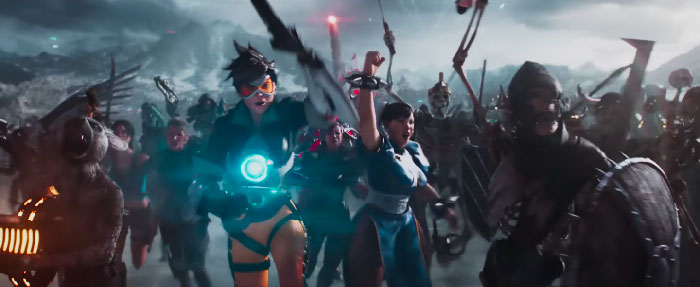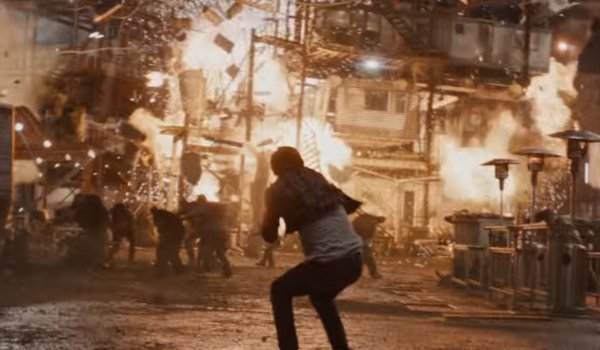
(Once again, I’m catching up for yesterday thanks to schoolwork. Yesterday’s NaPoWriMo prompt was for a response to a Sylvia Plath poem, but since I don’t understand or like Plath’s work much, I went with a nice simple limerick.)
There once was a debonair spy
Who told all his loved ones a lie.
His espionage
Was beneath camouflage,
But don’t ask him why or you die.
____________________
MPAA rating: R (for language, sex, and violence; you know, the usual)
What if the Terminator played an American James Bond and had a family? I always thought that might have been how James Cameron pitched True Lies, until I found out it was actually a remake of a French film called La Totale! with basically the same plot. I might see that one someday just for comparison’s sake, but remake or not, True Lies is a funny actioner that fits nicely in Schwarzenegger’s and Cameron’s filmographies.

Schwarzenegger plays Harry Tasker, a deadly and debonair secret agent, with “secret” carrying over into his personal life, since he keeps his counter-terrorism gig hidden from his wife Helen (Jamie Lee Curtis) and daughter Dana (Eliza Dushku, who recently revealed a sad account of sexual harassment during filming). Harry’s family thinks he’s just a mild-mannered bore, but he tends to spend his nights sneaking into high-security Russian parties and beating the crap out of bad guys in hotel bathrooms. Then one day he discovers evidence that his wife may be cheating with a wussy con man (Bill Paxton), and Harry’s jealousy threatens more than just his secrets.
True Lies is at its best as a popcorn action movie, especially a few bravura chase sequences, like Harry chasing a motorcycle baddie up a building while on horseback. The entire climax stretching from the Florida Keys to a skyscraper crane also ranks among the most thrilling finales out there, complete with a great cheesy one-liner that Donald Trump may have borrowed. Schwarzenegger and Curtis are in fine form, the one uber-capable, the other mousy and frantic when things spiral out of control; and they both benefit from strong support, whether comedic (Paxton and Tom Arnold) or villainous (Tia Carrere, Art Malik).
Unfortunately, it’s not all fun and explosions. The lies Harry tells go beyond just keeping his career secret, and his actions while he suspects his wife of cheating are morally suspect, never minding the fact that he had been dancing the tango with another woman earlier in the film with not a second thought. When he recruits his wife into a fake mission to give her a thrill, it becomes a somewhat funny but mostly distasteful charade that he should have thought better of beforehand.

That unsavory deception is the main thing that keeps True Lies from rising to the level of other action classics like Die Hard. It has everything you could want in the action department, but the familial reconciliation is only half-successful, considering the loss of trust. If you can put that aspect out of your mind, though, True Lies is a reminder of how entertaining ‘90s actioners could be.
Best line: (Gib, Harry’s partner) “Women. Can’t live with ‘em. Can’t kill ‘em!”
Rank: List Runner-Up
© 2018 S.G. Liput
567 Followers and Counting





















 A French-Belgian-Canadian co-production, April and the Extraordinary World is one of the most imaginative films I’ve seen in a while, broadly rewriting history to create a unique steampunk setting, one in which science and technology couldn’t develop beyond the Steam Age. Vegetation has been decimated by fuel needs, and the air is thick with industrial smoke, while the scientists that could improve things have vanished without a trace. After a fast-paced introduction in which everything is significant, we meet April Franklin (Marion Cotillard in the French version, Angela Galuppo in the English dub) and her brilliant family of fugitive scientists. Due to events best seen rather than described, April grows up alone with only her talking cat Darwin (a product of SCIENCE!), and her chemist’s quest for an immortality serum soon turns into a whirlwind adventure as the French government and a mysterious group with advanced technology vie for the scientific secrets of her family.
A French-Belgian-Canadian co-production, April and the Extraordinary World is one of the most imaginative films I’ve seen in a while, broadly rewriting history to create a unique steampunk setting, one in which science and technology couldn’t develop beyond the Steam Age. Vegetation has been decimated by fuel needs, and the air is thick with industrial smoke, while the scientists that could improve things have vanished without a trace. After a fast-paced introduction in which everything is significant, we meet April Franklin (Marion Cotillard in the French version, Angela Galuppo in the English dub) and her brilliant family of fugitive scientists. Due to events best seen rather than described, April grows up alone with only her talking cat Darwin (a product of SCIENCE!), and her chemist’s quest for an immortality serum soon turns into a whirlwind adventure as the French government and a mysterious group with advanced technology vie for the scientific secrets of her family. While the imagination is impressive, I could still recognize prior influences for April, most notably 2004’s Steamboy, another steampunk adventure featuring a young protagonist caught in the middle of a scientific power struggle with a similarly explosive ending. Plus, it’s hard to avoid comparisons to Ghibli when there’s an actual house atop mechanized legs á la
While the imagination is impressive, I could still recognize prior influences for April, most notably 2004’s Steamboy, another steampunk adventure featuring a young protagonist caught in the middle of a scientific power struggle with a similarly explosive ending. Plus, it’s hard to avoid comparisons to Ghibli when there’s an actual house atop mechanized legs á la 





